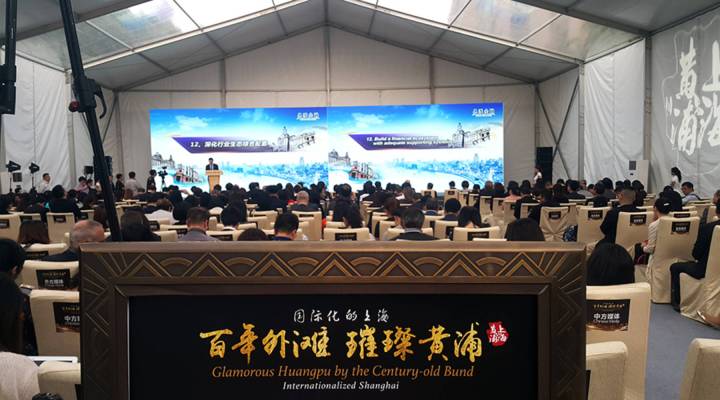
China touts its economic reforms amid U.S. tariff threats

On Shanghai’s famous waterfront, the Bund, some 300 officials, foreign business leaders and journalists gathered last week to celebrate the 40th anniversary of what China calls its “Reform and Opening” — an economic liberalization plan that opened the state-run economy to the outside world.
The reforms benefited companies like American-Italian automaker Fiat Chrysler.
Speaking on the lawn of the ornate former British Consulate on the Bund, Brian Williams, head of the firm’s financing division in China, told the crowd:
“We will be providing funding for more than 130,000 cars this year, helping customers achieve their aspirational dream … from the business owner needing a light commercial vehicle, to the luxury of a Maserati.”
Over the last four decades of reforms, the number of foreign companies in China has grown from 900 to half a million.
According to a recent report by the American Chamber of Commerce in China, more than half of the group’s members estimated that the revenues from their China operations went up in 2017 from the previous year. General Motors, for example, has counted China as its largest retail market for the past six years.
Th chamber said in its annual American Business in China white paper, however, that “extensive market access barriers, protectionism, an opaque regulatory system and discriminatory enforcement, among other practices, result in an uneven playing field for many U.S. companies operating in China.”
But at the celebration on the Bund, organized by Shanghai’s Huangpu district government, there was no mention of these concerns and no signs of the trade frictions between the United States and China. Instead, local officials trumpeted the reforms China has already taken as an example of its willingness to accommodate global trade. They offered incentives, such as office rental subsidies, for more local and foreign firms to set up their regional headquarters in the area.
“President Xi Jinping has emphasized that China is committed to opening its markets even wider,” Huangpu district Communist Party Secretary Gao Yun said.
American firms have pushed for such reforms and the U.S. Chamber of Commerce welcomed such commitments in its recent report.
“However, issues such as lack of consistency in policy implementation still persist in the daily operations of businesses in China,” the chamber’s white paper said.
Xiong Peng, a senior researcher with the Pangoal Institution, said China and other countries may have a different understanding of reform.
While China announced incremental rollbacks of its foreign ownership caps in the automotive and financial services sectors, Chinese officials have not appeased the United States by opening the rest of its strategic sectors, such as health care and the internet.
What steps Chinese officials have taken though, could be just as significant, Xiong said.
For example, China is planning to join the World Trade Organization’s government procurement agreement, which aims to create a level playing field for all companies competing for lucrative state contracts.
“Some government departments have avoided buying Microsoft products to support Chinese software. If China joins the agreement, American companies’ interests will also be considered,” Xiong said.
He agreed that China could do more to let foreign firms in. Chinese officials argued that China cannot be as open as the United States because the country is still developing.
Amid Shanghai’s stunning skyscrapers and multinational offices, it can be easy to forget that something as basic as a flushing toilet is still considered a luxury in many parts of China.
To boost growth, China wanted to develop emerging sectors like robotics and aviation.
American studies professor Wu Xinbo from Fudan University said U.S. officials are resistant to China’s industrial policies.
“The attitude of American officials is arrogant. They don’t want China to develop its high-tech industries. They’d prefer that we stick to low-value products,” Wu said.
| What you should know about the U.S.-China trade talks |
| As the steel tariff exemption process drags on, optimism wanes |
| How are Chinese manufacturers reacting to the threat of U.S. tariffs? |
Next week, the Trump administration will announce details of planned tariffs on $50 billion worth of Chinese goods that will include items related to the “Made in China 2025” industrial policy.
In the latest round of trade talks, held earlier this month in Beijing, the delegation led by U.S. Commerce Secretary Wilbur Ross tried to push China to buy more U.S. products and give American businesses more access to its markets.
China warned that if the United States continues to impose tariffs on Chinese goods, any agreements made so far between the two nations in the trade talks would be void.
The United States and China are now at an impasse. Importers have complained that Chinese officials are holding up some U.S. products from entering the country.
An importer of a leading brand of American whiskey to China who didn’t want to be named for fear of government retaliation, told Marketplace that he had delayed ordering new shipments because of the uncertainty over whether they would be allowed in. He was hopeful, though, that the current tensions would not escalate into a trade war.
Back at the celebration marking four decades of China’s economic reform, tensions were not in evidence as a New York jazz ensemble played popular hits and guests sipped wine serenely.
China wants to send the message that it is open for business, but it will do business on its own terms.
There’s a lot happening in the world. Through it all, Marketplace is here for you.
You rely on Marketplace to break down the world’s events and tell you how it affects you in a fact-based, approachable way. We rely on your financial support to keep making that possible.
Your donation today powers the independent journalism that you rely on. For just $5/month, you can help sustain Marketplace so we can keep reporting on the things that matter to you.


















